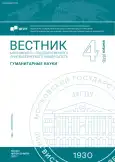Sentiment Analysis of Digital Communication
- Authors: Potapova R.K.1, Potapov V.V.2
-
Affiliations:
- Moscow State Linguistic University
- Lomonosov Moscow State University
- Issue: No 4(872) (2023)
- Pages: 86-96
- Section: Linguistics
- URL: https://journal-vniispk.ru/2542-2197/article/view/351964
- ID: 351964
Cite item
Full Text
Abstract
Digitalization in the field of the humanities is considered as a modern technological process of digital coding and decoding in a certain format of all types of humanitarian information that forms a certain information environment. The study of this environment includes many aspects: semiotic, semantic, emotional, valeological, etc. Special emphasis is given to the development of an iterative model, the analysis of which includes the dynamics of the transformation of the original digital text into a secondary digital intertext and then into a tertiary and n-ary interpretative text at the output of the communicative space, which, in our opinion, preconditions the emergence of an essentially new text; moreover, such a text is transformed with the help of special programs of digital censorship and digital editing into a completely new text. In this regard, we introduce the concept of a digital quasi-text containing transformed network information with elements of sentimentality and toxicity.
About the authors
Rodmonga Kondratyevna Potapova
Moscow State Linguistic University
Author for correspondence.
Email: RKpotapova@yandex.ru
Doctor of Philology (Dr. habil.), Professor, Full Member of the International Informatization Academy, Director of Institute of Applied and Mathematical Linguistics
Russian FederationVsevolod Viktorovich Potapov
Lomonosov Moscow State University
Email: Volikpotapov@gmail.com
Doctor of Philology (Dr. habil.), Senior Researcher of the Centre of New Technologies for Humanities, Philological Faculty
Russian FederationReferences
- Jannidis, F., Kohle, H., Rehbein, M. (2017). (Hg.). Digital Humanities. Eine Einführung. Stuttgart, J.B. Metzler Verlag.
- Panksepp, J. (1988) Posterior pituitary hormones and separation distress in chicks. Neuroscience. Abstracts. No. 14. P. 287.
- Payne, R. L., Cooper, C. (2008). Emotions and work. Research theories and methods of application: transl. from English. Kharkov: Humanitarian Center Publ. (In Russ.)
- Potapova, R. K., Potapov, V. V. (2017). Fundamentals of the multi-versatile voice and speech research of the «electronic personality» on the information and communication Internet medium. Human Being: Image and Essence. Institute of Scientific Information for Social Sciences of the Russian Academy of Sciences. No. 1–2. P. 87–111. (In Russ.)
- Gippenreyter, Ju. B., Falikman, M. V. (eds.). (2002). Psikhologija motivacii i emocij = Psychology of motivation and emotions. Moscow: CheRo Publ., Moscow Psychological and Social Institute Publ. (In Russ.)
- Jaspers, K. (1973). Allgemeine Psychopathologie. 8., korr. Aufl. Springer.
- Fiehler, R. (1990). Kommunikation und Emotion. Berlin; New York: Walter de Gruyter.
- Watson, D., Tellegen, A. (1985). Toward a consensual structure of mood. Psychological Bulletin. No. 98. P. 219–235.
- Minsky, M. (1974). A framework for representation knowledge. Cambridge, Massachusetts Institute of Technology.
- Goffman, E. (1986). Frame analysis: an essay on the organization of experience. Boston (Mass.): Northeastern University Press.
- Vahshtejn, V. S. (2011). Sociologija povsednevnosti i teorija freymov = Sociology of everyday life and the theory of frames. St. Petersburg: European University Publ. (In Russ.)
- Sarna, A. (2017). Intertekstualnyj analiz = Intertextual analysis. New media: social theory and research methodology (pp. 87–89), ed. by O. V. Sergeeva, O. V. Tereshchenko. St. Petersburg: Aletejja Publ. (In Russ.)
- Die Psychologie des Postfaktischen (2020): Über Fake News, „Lügenpresse“, Clickbait & Co. Berlin; Heidelberg: Springer.
- Appel, M. (2020). Die Psychologie des Postfaktischen-Einleitung und Überblick. In Die Psychologie des Postfaktischen: Über Fake News, „Lügenpresse“ (pp. 1–7). Berlin; Heidelberg: Springer.
- Bart, R. (1994). Izbrannyye raboty. Semiotika. Poetika = Selected Works. Semiotics. Poetics: Transl. from French. Moscow: Progress. (In Russ.)
- Rieger, D., Dippold, J., Appel, M. (2020). Trolle gibt es nicht nur in Märchen – das Phänomen Trolling im Internet. In Die Psychologie des Postfaktischen: Über Fake News, „Lügenpresse“ (pp. 45–58). Berlin; Heidelberg, Springer.
- Potapov, V. V., Maslova, N. Je. (2021). O strukturnom modelirovanii provokacionno-evokacionnyh slovoform russkojazychnogo segmenta Interneta = On Structural Modeling of Provocative-Evocative Word Forms in the Russian-Speaking Segment of the Internet. In Potapov, V. V., Kazak, E. A. (eds.), Language in a global context: language contacts and language conflicts in the modern world (pp. 50–61). Moscow: Institute of Scientific Information for Social Sciences of the Russian Academy of Sciences Publ. (In Russ.)
- Jakobson, R. (1972). Verbal communication. Scientific American, 227(3), 73–80.
- Stein, J.-Ph., Sehic, S., Appel, M. (2020). Machtvolle Bilder und Bildmanipulationen. In Die Psychologie des Postfaktischen: Über Fake News, „Lügenpresse“ (pp. 177–182). Berlin; Heidelberg: Springer.
- Potapova, R. (2015). From Deprivation to aggression: verbal and non-verbal social network communication. In Global Science and Innovation (pp. 129–137): International Conference. Chicago, November 18th–19th.
Supplementary files










